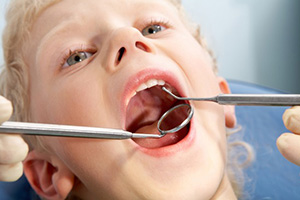Little kids are not the only ones that love candy! Americans love sweets – from desserts to soda – we tend to eat huge amounts of sugar every day. Our Santa Monica dentists always tell patients that sugar is not their friend, and can cause issues for their oral health. Even the early Greeks knew that sugar can cause tooth decay. The Accidental Scientist writes that: “It was the ancient Greeks who first noticed that sweet foods had a bad effect on teeth. One Greek book called Problems asks ‘Why do figs, which are soft and sweet, destroy the teeth?’”
Oral Health Issues Caused by Sugar
1. Tooth Decay
2. Cavities
3. Weakened Teeth and Gums
4. Toothache
5. Gum disease

Why Does Sugar Cause Tooth Decay?
The good news, according to Santa Monica dentists, is that if you brush your teeth after you consume sugar, you will most likely prevent a toothache and any problems for your teeth. That is because “sugar itself is not corrosive to the enamel, according to the science division of the American Dental Association,” states the New York Times. “Rather, the bacteria in dental plaque metabolize sugar and release acid that can break the enamel down.” Our mouth has streptococcus bacteria that loves to feed on sugar. Sugar that is consumed releases an enzyme called a salivary amylase in our mouth that interacts with the bacteria. So the longer sugar is left on your teeth, the more damage it will cause to your plaque, where bacteria lives, and cause tooth decay and other issues.
Ways to Prevent Tooth Decay From Sugar
If you want to prevent yourself from having a bad toothache or other forms of tooth decay and gum disease, follow these steps.
1. Cut down your sugar intake – Yes, you may need that sugary sports drink to get through a tough workout, or a chocolate to make it through a long workday, but try to minimize the amount of sugar in your diet. Many people simply don’t know that the food and drinks they consume contain sugar. While you are definitely aware that candy and ice cream are sweet, you need to keep in mind that things like fruit, coffee beverages, even bread and pasta may contain sugar. Once our patients are aware of what they are eating and drinking, they usually tend to naturally cut down their sugar intake.
2. Brush your teeth – Now that we know the longer sugar is left on the teeth, the more damage it can cause to oral health, we should remember to brush our teeth after eating. This is easy enough to do at home, but it’s also not difficult to do at work or on the go. Pack a little travel case with a mini-sized toothbrush and toothpaste; they are often sold in the travel sections of drugstores.
3. Use sugar substitutes – The New York Times found that sugar substitutes and artificial sweeteners don’t cause as much tooth decay as real sugar. “Sugar substitutes are loosely considered a sweetener that you use instead of regular table sugar (sucrose),” states the Mayo Clinic.
“Sugar substitutes, like low-calorie sweeteners, do not have the same effect. In fact, some sweeteners, called polyols, have antibacterial properties,” the NYT explains. “Polyols, also known as sugar alcohols because they can be derived from sugars through a chemical process, include malitol, sorbitol, xylitol and isomalt. They are not broken down by oral bacteria and thus do not contribute to the formation of cavities.”
However, sugar substitutes have been found to cause some health concerns, including cancer. Speak to your doctor or dentist about switching to sugar substitutes to prevent tooth decay and other oral problems.
For more information about treating tooth decay in Santa Monica, visit us here.





